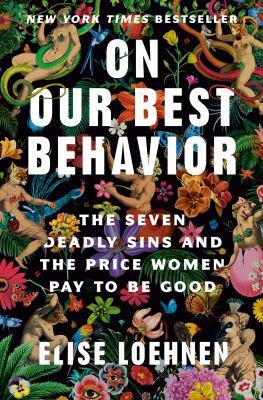
On our best behavior : the seven deadly sins and the price women pay to be good
We congratulate ourselves when we resist the donut in the office breakroom. We celebrate our restraint when we hold back from sending an email in anger. We feel virtuous when we wake up at dawn to get a jump on the day. We put others' needs ahead of our own and believe this makes us exemplary. In On Our Best Behavior, journalist Elise Loehnen explains that these impulses--often lauded as unselfish, distinctly feminine instincts--are actually ingrained in us by a culture that reaps the benefits, via an extraordinarily effective collection of mores known as the Seven Deadly Sins. Since being codified by the Christian church in the fourth century, the Seven Deadly Sins--pride, greed, lust, envy, gluttony, wrath, and sloth--have exerted insidious power. Even today, in our largely secular, patriarchal society, they continue to circumscribe women's behavior. For example, seeing sloth as sinful leads women to deny themselves rest; a fear of gluttony drives them to ignore their appetites; and an aversion to greed prevents them from negotiating for themselves and contributes to the 55 percent gender wealth gap
Available Copies by Location
| Location | |
|---|---|
| Stamford | Available |
Browse Related Items
- ISBN: 9780593243039
- Physical Description xxvi, 353 pages ; 25 cm
- Edition First edition.
- Publisher [Place of publication not identified] : [publisher not identified], 2023.
Content descriptions
| Bibliography, etc. Note: | Includes bibliographical references and index. |
Additional Information

Publishers Weekly Review
On Our Best Behavior : The Seven Deadly Sins and the Price Women Pay to Be Good
Publishers Weekly
(c) Copyright PWxyz, LLC. All rights reserved
Pulling the Thread podcaster Loehnen debuts with a searching study of how the seven deadly sins (sloth, envy, pride, gluttony, greed, lust, and anger) developed into a web of "cultural programming" that deems women "to be inferior in every way." She traces the roots of the seven deadly sins back to fourth-century monk Evagrius Ponticus, whose list of eight "passionate thoughts" also included sadness, and notes that when Pope Gregory first preached about the "Capital Vices," he "assigned to Mary Magdalene and branded her a whore." Restoring sadness to the list and devoting a chapter to each concept, Loehnen unpacks the ways in which women contort themselves to "be good" within a system that is designed to oppress them. The section on sloth, for example, discusses the guilt felt by working mothers "that by shirking parenthood as our sole objective, we're not doing our real jobs." Associating the "energy of the feminine" with "creativity, nurturance, and care," Loehnen calls for its resurgence to "bring our culture's toxic masculinity into balance." Though Loehnen's argument can be difficult to follow, she incisively draws from the work of thinkers including Kate Manne and Gerda Lerner and weaves in poignant autobiographical reflections. It's a laudable effort to pull up the roots of patriarchy. (May)

Kirkus Review
On Our Best Behavior : The Seven Deadly Sins and the Price Women Pay to Be Good
Kirkus Reviews
Copyright (c) Kirkus Reviews, used with permission.
An analysis of society's behavioral expectations for women. Drawing largely on her own experiences, Loehnen, the host of the Pulling the Thread podcast and former editorial projects director of Condé Nast Traveler, contends that women have been unwittingly programmed to behave in a certain manner in order to be accepted. "Where did this beast come from," she asks, "how did it get its power, and why was I so willing to submit? I began to trawl through history to locate the early murmurs of when good-ness and acceptability were conjoined for women." Loehnen shows that the framework for this programming arose via the Seven Deadly Sins found in Christian teachings. The author explores the origin of the sins and examines each in relation to the modern life of women. As Loehnen points out, the sins were based on the "Eight Thoughts" of a fourth-century monk named Evagrius Ponticus, which additionally included the concept of "sadness" and became a teaching tool for the church. While the concepts referenced in the book do have strong religious underpinnings, the author's language and writing style are more secular in nature and will appeal to a wide audience. "Even if you consider yourself an atheist, or agnostic, or opposed to organized religion, the moral codes directed by the Seven Deadly Sins have influenced you," she writes. "They are not solely the prove-nance of the church; the sins have permeated culture." Throughout, Loehnen demonstrates that women have limited their lives based on these artificial restrictions and must strive to break free from this "tool of oppression." For example, out of fear of appearing slothful, women frequently deny themselves rest. For fear of appearing gluttonous, women often deny their own hunger. Afraid of being deemed "unhinged," women are often apprehensive about expressing their anger. An engaging work that offers an opportunity for pause and reflection regarding our daily choices. Copyright (c) Kirkus Reviews, used with permission.


